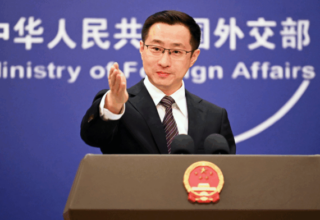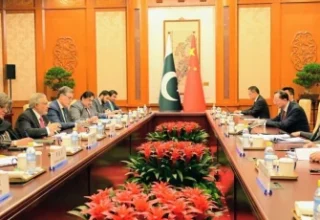
About 50% of participants believe China, US can work together to fight COVID-19
Global Times Report
BEIJING, China – After a series of frictions and struggles with the US in areas such as economy, trade, science and technology, as well as diplomacy and security, Chinese people have an unshakable consensus in opposition of US hegemony but they can still separate American culture and people from the government, according to a survey from the Global Times, with Chinese experts saying that this can lay the foundation for the two countries to fix relations in the future.
The Global Times poll center conducted a survey from December 11 to 17 and collected 1,945 questionnaires from respondents aged 18-69 from 16 Chinese major cities across the country including Beijing, Shanghai, Guangzhou, Shenzhen, Chengdu, Tianjin and Xi’an.
The survey questions covered Chinese people’s general view on China’s ties with other countries such as “which bilateral relationship has the biggest impact on China” and also very detailed questions on specific issues such as “How should China and the US strengthen ties after Joe Biden becomes US president.”
Most participants of the survey still believe that ties with the US are the most important bilateral ties for China, since 47.5 percent of them said the China-US relationship has the biggest impact on China, but compared to data from 2019 – 82.1 percent, this number has reduced sharply.
The survey shows that more people are starting to recognize the importance of ties with developing countries. 14.8 percent of participants chose China’s ties with Southeast Asian countries for “the ties that bring the biggest impact on China,” but in 2019, only 9.2 percent of participants chose this option.
Experts said that in 2019, the trade war launched by the US dominated the public discussion and media reports so most Chinese at that time would have surely believed that ties with the US were important, but after a series of struggles from 2019 to 2020, Chinese people found that impacts from the US’ bullying and trade war have been very limited, and many people don’t even have any feelings about it, so these people would have questioned whether the US is really that important.
In addition, the signing of the Regional Comprehensive Economic Partnership (RCEP) has made many Chinese realize that ties with other developing countries are more significant and reliable, especially as the US and some other Western countries are getting more and more hostile and unpredictable, so that’s why more people are aware of the importance of developing countries rather than merely watching the major powers, experts said.
Source. Global Times

Views on the US
Although Western media and politicians accuse China of hyping nationalism or so-called “wolf warrior diplomacy” to be more aggressive toward the West, especially the US, the survey shows a more comprehensive and objective picture of how China views the US at present.
On the Trump administration, 65.6 percent of participants found it to be “unfavorable,” and 53.2 percent found US military forces, which frequently provoke China in the South China Sea and on the Taiwan question, to be unfavorable, while 46.9 percent found the US media, which reports China with bias and arrogance, to be unfavorable as well.
But on US sport leagues, such as the NBA, which has a huge amount of fans in China, only 11.6 percent of participants chose “unfavorable” while 39 percent chose “favorable” and 43.3 percent chose “neutral.” On US universities, electronic products, movies and television, the survey shows similar data. For example, 49.9 percent of Chinese participants found US movies and television works, such as Hollywood films, US-made TV series and animated movies, to be favorable. On American people, 67.2 percent chose “neutral.”
Diao Daming, an expert on US studies at the Renmin University of China in Beijing, told the Global Times that “this proves that Chinese people’s view on the US is objective and pragmatic. On the one hand, they are seriously offended by the unilateral moves made by the US government to harm bilateral ties; but, on the other hand, their favorable impression toward American society and culture has not been affected too much by some irresponsible moves made by US politicians.”
This lays the necessary foundation for the two countries to repair ties; that is, enhancing people-to-people communication will be important, Diao said.
Although most participants have clearcut views that separate the US government from American people, more than 60 percent of participants have pessimistic views on a new cold war between China and the US. About 28.4 percent of the surveyed believe a China-US cold war is possible, compared to those who believed it is very likely (18.6 percent) or even unavoidable (9.1 percent), and some even believe it has already begun (12 percent).
But they are very optimistic on the result of China-US competition. More than 70 percent believe that China is having more and more advantages amid competition with the US.
Diao said this is a very impressive result as it proves that US suppression and offensives against China have failed to shake the confidence of the Chinese people on the development of the country and the trend of the international situation; and that people’s trust and support for the Communist Party of China and the Chinese government remains strong.
Goodwill toward Biden?
The US election this year has drawn great attention in China, and the survey shows that 31.7 percent of participants believe Joe Biden will bring some opportunities to ease China-US tensions, but 28.5 of them remain pessimistic on the new US administration, and 39.8 percent found the situation to still be unclear.
Chinese analysts said this has showed that Chinese people’s feelings over the incoming Biden administration are mixed with goodwill, worry and uncertainty.
“After four tumultuous years of the Trump administration, not only Chinese people, but also the rest of the world has something to look forward to with Biden. But the world cannot go back to the past, and China-US ties cannot go back either,” Wang Yiwei, director of the Institute of International Affairs at Renmin University of China, told the Global Times on Friday.
On “in what fields can China boost cooperation with the US after Biden takes office,” 48.7 percent chose fighting the COVID-19 pandemic, 44.4 percent chose economy and trade, 39.9 percent chose combating climate change, but 12.1 percent think that “the two countries will not strengthen cooperation.”
According to Wang, the space for China-US cooperation in the above-mentioned fields is limited as competition has become the common trend between the two super powers.
In areas other than anti-epidemic supplies exchanges, the US is wary of cooperation, such as cooperation on facial recognition technology and health QR codes for epidemic prevention in China, said Wang, noting the US does not trust China on privacy issues.
The US believes that they have the most advanced medical systems and their own pride does not allow the Chinese to help them as China has achieved victory in containing the virus,” said Wang. “There will still be civilian cooperation, but competition on most issues, including vaccines, will be limited.”
China’s GDP is expected to reach 70 percent of the US’ by the end of 2020, and may overtake the US’ around 2028, the Wall Street Journal reported, citing industry analysts.
In addition to 5G, China is overtaking the US in digital economy, artificial intelligence, and there will be more competition in the future, rather than cooperation, said Wang.
“The Biden administration may not impose new tariffs on China, but it will not eliminate Trump-era tariffs made to pressure China. And non-tariff barriers, such as labor rights protection, facial recognition and environmental protection, will be incorporated into trade competition, creating new frictions,” Wang said.
Biden’s backers are mainly from Wall Street, Silicon Valley, and the new energy industry, which all have certain expectations for the Chinese market, making fighting climate change one of the few areas of potential cooperation, analysts said. However, the Biden administration will not give up attempts to suppress China through multilateral mechanisms when needed.
Surveys show that the Trump administration’s suppression of China has failed to achieve its goal of dividing the Chinese government and people, but it has actually made Chinese people more supportive of their country.
Wang noted that the Biden administration is relatively realistic and will find other ways after Trump’s brutal yet unsuccessful suppression of China. “The trade war has been going on for more than three years and the US has failed to achieve its goal. The new administration will certainly not continue on the same path.”
“There is a US saying that ‘if you can’t beat them, join them’ — but a desire still exists to ‘beat China’ the US way,” Wang said.
“The US will only sit down and talk to China if China really leads in some areas, which is more likely to happen around 2030,” he added.








